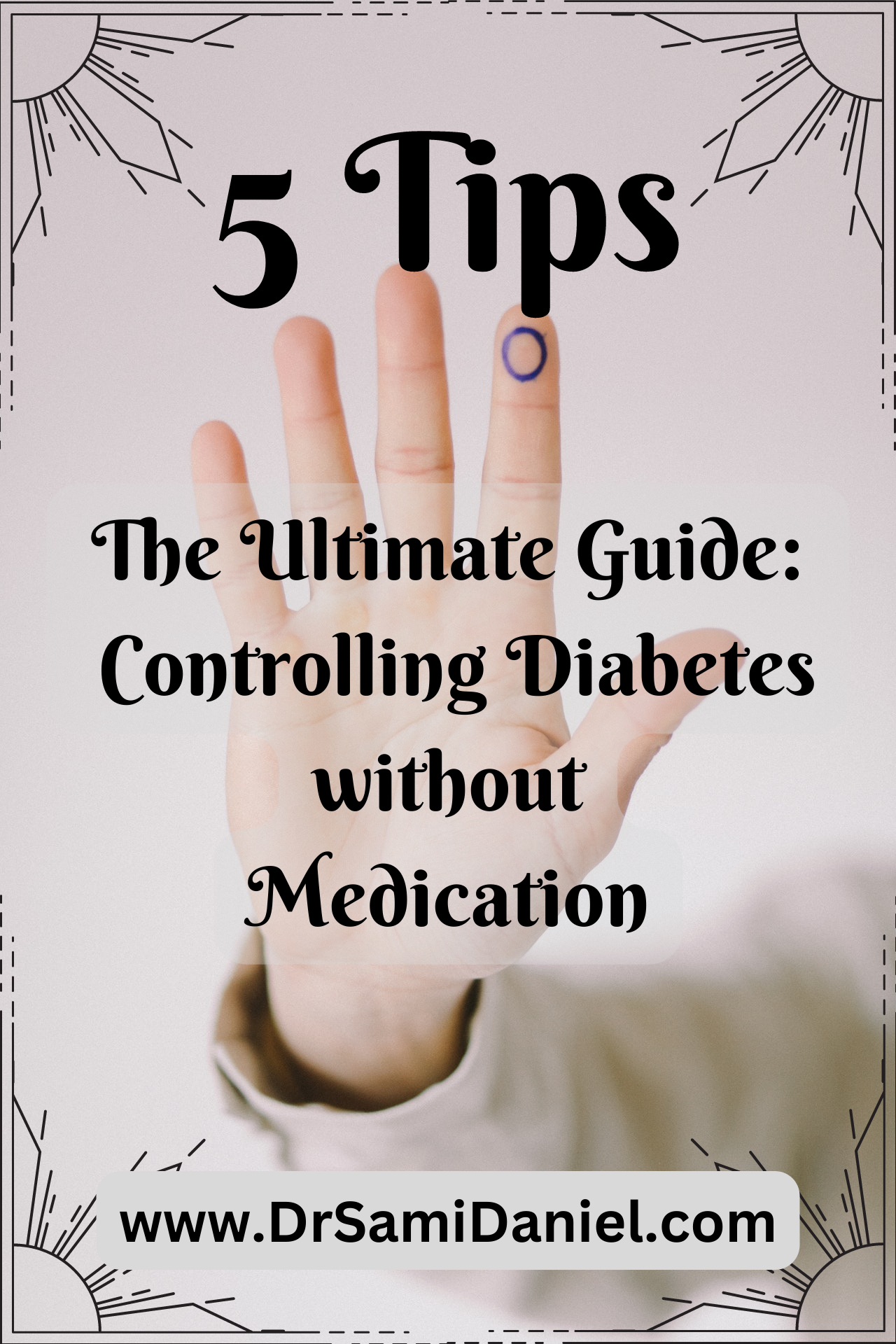5 Tips: The Ultimate Guide to Controlling Diabetes without Medication
“Do I need to take medication?”
This is the most common question I hear when someone finds out they have diabetes.
The quick answer is, “No”.
This is a free country and you are free to do as you please.
However if your doctor is suggesting medication, please carefully consider why your doctor thinks that starting medication is important for you.
There are many reasons a patient is reluctant to start medication.
In my opinion, the patient is either shocked, neutral, or worried.
These responses are usually based on the types of experiences a patient has had with the diagnosis.
Their father may have had a heart attack; their mother may have had a stroke; their friend may have had an amputation.
At some point during these experiences, a doctor may have told them that these conditions may have been caused by uncontrolled diabetes.
Doctors do not work hard to control diabetes; they work hard to control the complications of diabetes.
Complications include, but are not limited to:
- Heart disease
- Stroke
- Kidney failure
- Blindness
- Nerve damage
- Dementia
So controlling blood sugar is very important to lower the risk of complications.
While medication can help stabilize blood sugar levels, it’s not the only solution to managing diabetes. In this post, we’ll explore some effective ways to control diabetes without medication. Just remember, you might still need medication. So speak with your doctor to decide what’s best for you.
The Vicious Cycle of Diabetes
Most people think that there is no harm with high blood sugar levels; and most people would be right.
Your blood sugar levels are supposed to go up after you eat something and then come back down a few hours later. That is the natural rhythm of blood sugar in the body.
The problem comes when the blood sugar stays high.
High blood sugar levels can damage your organs, leading to complications like blindness, kidney failure, and heart disease.
It’s a cycle that can wreak havoc on your body and leave you feeling like there’s no way out.
This feeling of hopelessness can lead to depression and anxiety, which can further exacerbate your condition.
However, the good news is that you can take control of this cycle. By implementing some simple lifestyle changes, you can manage your diabetes and improve your overall health.
Tip 1: Take Control of Your Emotional State
Yes, diabetes can make you feel like you’ve fallen into a bottomless pit with no hope of getting out.
Diabetes can feel overwhelming.
As I previously mentioned, this can ironically worsen diabetes.
It’s like anxiety and stress spiked the punch bowl with extra sugar.
So what do you do?
I have a cliché answer for you – RELAX!
Cue the eye rolls. Yeah… I know… “Thanks for the revelation genius!”
Try telling a single mother to relax while she’s trying to raise her kids and make ends meet. Or how about a family man who just got laid off and doesn’t know what he’s going to do to support his family while he’s on the job hunt.
Here’s a little secret: If we do not take a break, our brains force us to take breaks. If we do not take a break, our bodies force us to take breaks. And these impromptu breaks usually happen at the most inconvenient times.
So we cannot decide IF we want to take a break. We have to decide WHEN to take a break.
It’s our decision to take a moment which is convenient versus leaving it to chance and hoping for the best.
One of the most important things you can do is take control of your emotional state.
It’s important to take time for yourself every day to relax and unwind.
Whether it’s through meditation, yoga, or simply taking a walk, find a way to calm your mind and reduce stress. One caveat: alcohol/drug use and screen time do not count as a break. I don’t think I have to make that caveat explicit, but I don’t want to risk any confusion.
Taking control of your emotional state can help you manage your diabetes more effectively.
Diabetes can be a lonely and isolating condition, but talking about your feelings with family or friends can help you feel more connected and supported.
If you’re struggling to manage your emotions, think about talking to a therapist or joining a support group.
Tip 2: The Power of Diet
“Well what’s left to eat, doc?!”
That’s a common question I hear when you basically tell someone that they can no longer have Foods with simple carbohydrates in them.
The irony is that the question itself shows how a person perceives food.
A person’s perception of food reveals the imbalance.
At a very basic level, diabetes is a result of an unbalanced diet.
A diet full of simple carbohydrates is unbalanced and may lead to diabetes over time.
A diet full of simple carbohydrates does not represent the richness and diversity of whole foods.
Eating a balanced diet can help stabilize your blood sugar levels and improve your overall health.
Avoid processed foods and focus on whole, nutrient-dense foods like fruits, vegetables, and lean protein. Limit your intake of simple carbohydrates and sugars, and be mindful of portion sizes.
Always aim for a balanced diet.
You do not have to cut out the foods you love. But you do have to balance them with foods that are vital to your health.
Tip 3: Exercise Regularly
“I can’t exercise, everything hurts”
“I’m super busy and don’t have time.”
“I’m walking all day at work, so why do I have to do more?”
These are three of the most common responses I hear from people.
Again, the response reveals a person’s perception of a situation.
All of these reasons are plausible and should be evaluated accordingly.
If something hurts, there could be an actual problem that needs to get checked out by the doctor. So have it resolved before attempting physical activity.
If you are busy and do not have the time, then consider your schedule. Can you carve out 2% of your day for a brisk walk after dinner? (Hint: 2.08% of your day is only 30 minutes)
If you are walking all day, how much are you actually walking? Quantify it. Tell me how many steps you take in a day. Translate that to calories burned in a day and compare it to your intake of calories.
Get specific about what is stopping you.
Exercise is a powerful tool in managing diabetes. Regular physical activity can improve insulin sensitivity and control blood sugar spikes, making it easier for your body to regulate blood sugar levels.
Start with something simple like a 5 minute walk. It won’t do much, but it’s better than nothing and it will start building a great habit. Get strategic and walk 5 minutes after dinner to use some of those carbohydrates.
Gradually build up your endurance. A 5 minute walk can turn to 10 minutes. You can keep adding 5 extra minutes every week or every 2 weeks.
You can also try different types of exercise to find what works best for you. For example, if you have joint pain, swimming or yoga may be a better option than walking.
You want to build the habit slowly but consistently and conveniently to make it stick. It’s less painful than needle sticks!
Tip 4: Get Enough Sleep
Sleep is wildly important for a person with diabetes. Why?
When you are sleep deprived, your brain is not happy.
You start looking for easy energy. There is nothing easier than a donut and coffee.
On my drive to work in the morning, the two places I see with jam-packed drive-thru’s are coffee shops and donut shops.
I’m not saying that all these people are sleep deprived and therefore cranky. However there is a really good reason why those drive-thru’s are spilling over into traffic.
Simple carbohydrates offer quick access to high energy with little effort. Coffee offers caffeine to give us a nice jolt of alertness.
But these are cheap sources of energy that do not last long.
Sleep is essential for overall health, and it’s especially important for people with diabetes.
Lack of sleep can increase stress levels and ironically cause blood sugar levels to rise. So if blood sugar levels are up, why do we feel compelled to reach for deep-fried donuts and sugary-caffeinated beverages? Good question, but I don’t have a good answer.
I think the brain is trying to find a cheap substitute for sleep.
Getting enough sleep can help you manage your diabetes more effectively by keeping stress levels down and sugar levels down. Controlling your blood sugar improves your overall health.
If you’re having trouble sleeping, try creating a relaxing bedtime routine. This can include taking a warm bath, reading a book, or listening to calming music. Create a ritual that activates the sleep initiation sequence in your brain.
My personal sequence: A cup of earl grey tea about 1 hour before bed (the caffeine doesn’t keep me awake, so just be mindful if you try this strategy), dim lights, and journaling (there’s something about writing my thoughts down that comforts my brain so that it does not worry about remembering the item later).
Tip 5: Surround Yourself with Support
Yup. You can be blessed or cursed with this one.
Some of us are blessed to have supportive family and friends that do all they can to help us. The rest of us, maybe 50% blessed? Or less? 😛
There are support groups. The American Diabetes Association has information on finding people who share your battles.
Again, your perception is everything. You might think you’re all alone; but when you open the right eyes (such as a computer with internet access), magic happens!
Managing diabetes can feel overwhelming, but you don’t have to do it alone.
So look for your people. Surround yourself with supportive friends and family members who understand your condition and can offer encouragement.
If all else fails, talk with a counselor to help manage the emotional toll of diabetes.
Surrounding yourself with support can help you manage your diabetes more effectively and improve your overall well-being.
Final Thoughts
Diabetes can be managed without medication, BUT (that’s a BIG but) you may need medications anywhere along your path towards health; even in the beginning.
A holistic approach is extremely important to your health.
Take control of your emotional state.
Get enough sleep.
Surround yourself with support.
Take medications as directed by your doctor.
Controlling diabetes without medication is not an easy feat. It takes dedication, effort, and the willingness to change your lifestyle.
But you have the power to take control and improve your overall health and well-being.
Make small and sustainable changes over time to form successful and long-lasting habits.
Thank You
Thank you for reading!
Please leave comments and subscribe to my weekly newsletter!
References
https://diabetes.org/get-involved/community/local-offices/chicago-illinois







